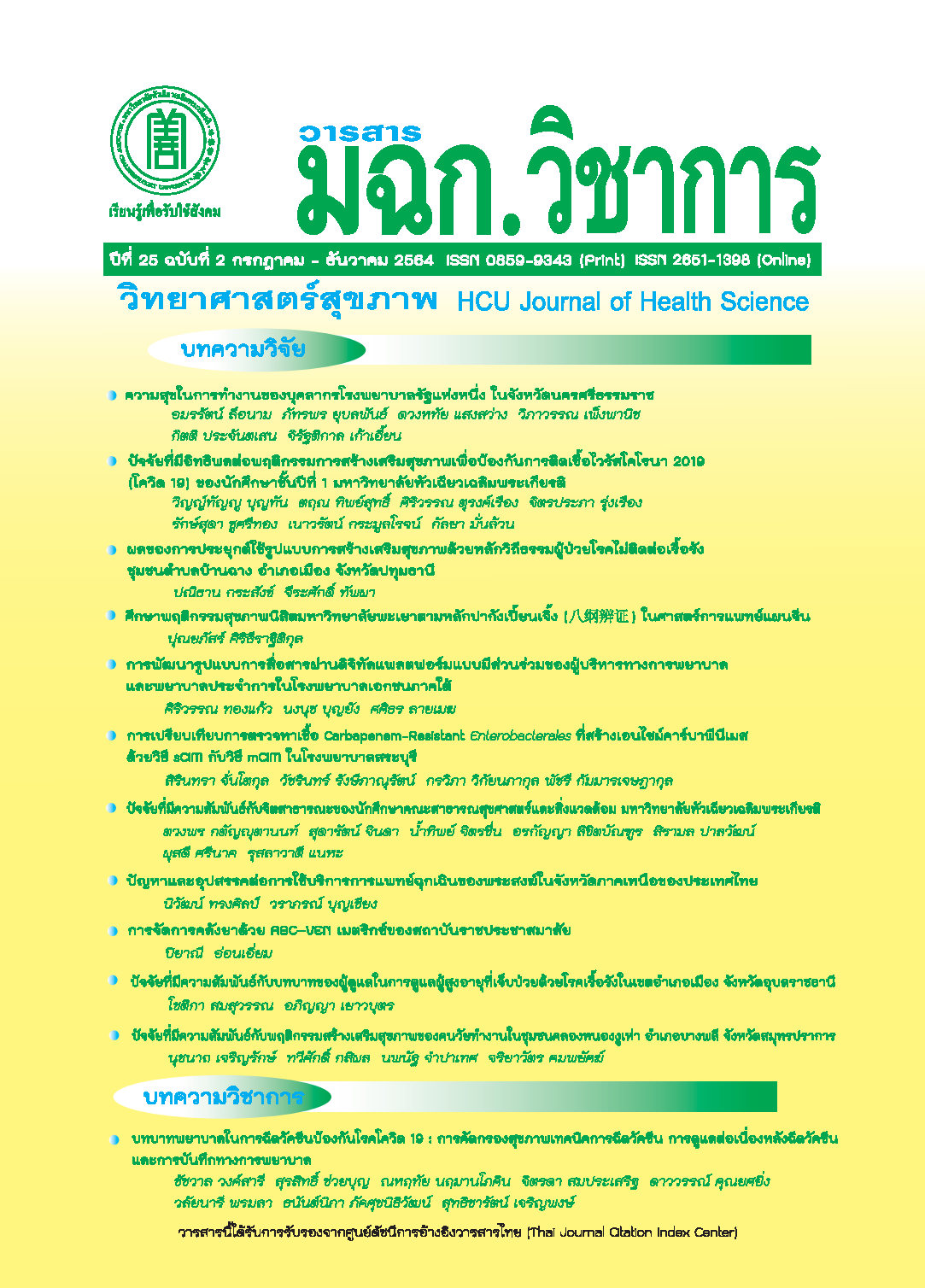A Survey of Health Behaviors of Students at University of Phayao according to Eight Principles of Syndrome Differentiation in Traditional Chinese Medicine (Ba Gang Bian Zheng)
Keywords:
Traditional Chinese Medicine, Physical Health, Ba Gang Bian ZhengAbstract
This study was survey research with the objectives to 1) study the health behaviors of students at the University of Phayao; 2) analyze and differentiate the early syndrome of students at the University of Phayao according to the Eight Principles of Syndrome Differentiation in Traditional Chinese Medicine (Ba Gang Bian Zheng), and 3) study the relationships between health behaviors and early syndrome of students at University of Phayao according to Ba Gang Bian Zheng principles. In this study, a questionnaire as a research instrument in collecting data from a total of 392 students at the University of Phayao. The analysis and differentiation of the syndrome showed that 18.62% of the syndrome could be classified as Exterior syndrome, 11.48% were Deficiency Cold syndrome and 10.20% were Excess Cold syndrome. For personal behaviors of students, it was found that the most common behaviors were staying up late, not getting enough, and not being active (with an average of 2.85 and 3.09, respectively). The behaviors with moderate frequency included consuming cold drinks or food, consuming hot drinks or food, consuming fast food, being hot-tempered, and being easily irritable (with an average of 5.68, 8.58, 6.24, and 5.41, respectively). The behaviors with low frequency included drinking alcohol and depression (with an average of 2.00 and 1.91, respectively). The analysis of relationships between behaviors and syndromes using Pearson’s chi-square test showed that staying up late and not getting enough sleep affected all the syndromes according to Ba Gang Bian Zheng principles (Exterior/Interior/Cold (Yin)/Hot (Yang)/ Deficiency / Excess syndrome), while emotion and not being active affected the Exterior/Interior/Hot (Yang)/ Deficiency/Excess syndrome, and drinking cold drinks and food affected the Cold syndrome. In addition, drinking hot drinks or food affected the Hot syndrome, and consuming fast food and drinking alcohol affected the Interior/Deficiency/Excess syndrome at the statistical significance level of p < 0.05 and p < 0.01.
Downloads
References
2. ซือจิ้ง. การแพทย์แผนจีนในศตวรรษที่ 21. วารสารการแพทย์แผนไทยและแพทย์ทางเลือก. 2546;1(1):54-64.
3. สำนักสถานพยาบาลและการประกอบโรคศิลปะกรมสนับสนุนบริการสุขภาพ. มาตรฐานการประกอบโรคศิลปะสาขาการแพทย์แผนจีน. แนวคิดและหลักการเกี่ยวกับมาตรฐานการประกอบโรคศิลปะสาขาการแพทย์แผนจีน [อินเทอร์เน็ต]. 2563 [เข้าถึงเมื่อ 27 พฤศจิกายน 2563]. เข้าถึงจาก: https://mrdhss.moph.go.th/ebook/chinesemedicine%E2%80%8E.pdf
4. สำนักงานสภาพัฒนาการเศรษฐกิจและสังคมแห่งชาติ. รายงานภาวะสังคมรายไตรมาส [อินเทอร์เน็ต]. [เข้าถึงเมื่อ 20 มกราคม 2563]. เข้าถึงจาก: https://www.nesdc.go.th/main.php?filename=social
5. วรพงศ์ ชัยสิงหาญ. มะเร็งปอดกับการรักษาด้วยแพทย์แผนจีน [อินเทอร์เน็ต]. 2561 [เข้าถึงเมื่อ 17 พฤศจิกายน 2563]. เข้าถึงจาก: https://www.huachiewtcm.com/content/6291/%E0%B8%A1%E0%B8%B0%E0%B9%80%E0%B8%A3%E0%B9%87%E0%B8%87%E0%B8%9B%E0%B8%AD%E0%B8%94%E0%B8%81%E0%B8%B1%E0%B8%9A%E0%B8%81%E0%B8%B2%E0%B8%A3%E0%B8%A3%E0%B8%B1%E0%B8%81%E0%B8%A9%E0%B8%B2%E0%B8%94%E0%B9%89%E0%B8%A7%E0%B8%A2%E0%B9%81%E0%B8%9E%E0%B8%97%E0%B8%A2%E0%B9%8C%E0%B9%81%E0%B8%9C%E0%B8%99%E0%B8%88%E0%B8%B5%E0%B8%99
6. กรมพัฒนาการแพทย์แผนไทยและแพทย์แผนทางเลือก. ศาสตร์การแพทย์แผนจีนเบื้องต้น. กรุงเทพฯ: สำนักงานกิจการโรงพิมพ์ องค์การทหารผ่านศึกในพระบรมราชูปถัมภ์ กระทรวงสาธารณสุข; 2551.
7. โกวิท คัมภีรภาพ. ทฤษฎีพื้นฐานการแพทย์แผนจีน. พิมพ์ครั้งที่ 4. กรุงเทพฯ: แอคทีฟพริ้นท์; 2558.
8. วิทวัส วัณนาวิบูล. เซียวเข่อ เบาหวานในทรรศนะแพทย์แผนจีน [อินเทอร์เน็ต]. 2547 [เข้าถึงเมื่อ 15 มกราคม 2563]. เข้าถึงจาก: https://www.doctor.or.th/article/detail/2038
9. Zhu W. Diagnostics of Traditional Chinese Medicine. Beijing: China press of Traditional Chinese Medicine; 2019.
10. โกวิท คัมภีรภาพ. การตรวจวินิจฉัยทางการแพทย์แผนจีน. พิมพ์ครั้งที่ 3. กรุงเทพฯ: แอคทีฟพริ้นท์; 2551.
11. พัชราภรณ์ ศรีสวัสดิ์. การให้คำปรึกษากลุ่มแบบเผชิญความจริงเพื่อเสริมสร้างสุนทรีย์แห่งตนของนักเรียนชั้นประถมศึกษาตอนปลาย. วารสารฉบับภาษาไทย สาขามนุษยศาสตร์ สังคมศาสตร์ และศิลปะ. 2560;10(2):381-2.
12. กฤษดา ตามประดิษฐ์. พฤติกรรมสุขภาพของนิสิตมหาวิทยาลัยพะเยา. วารสารวิชาการมหาวิทยาลัยกีฬาแห่งชาติ. 2563;12(1):3-4.
13. ศิริพงศ์ พฤทธิพันธุ์. ระเบียบวิธีวิจัยสาหรับธุรกิจ. พิมพ์ครั้งที่ 3. กรุงเทพฯ: ฮาซันพริ้นติ้ง; 2553.
14. วัชราภรณ์ สุริยาภิวัฒน์. วิจัยธุรกิจยุคใหม่. กรุงเทพฯ: จุฬาลงกรณ์มหาวิทยาลัย; 2556.
15. กัลยา วานิชย์บัญชา. การวิเคราะห์สถิติชั้นสูงด้วย SPSS for Window. พิมพ์ครั้งที่ 12. กรุงเทพฯ: สามลดา; 2560.
Downloads
Published
How to Cite
Issue
Section
License
บทความที่ได้รับการตีพิมพ์เป็นลิขสิทธิ์ของวารสารวิทยาศาสตร์สุขภาพและสุขภาวะ
ข้อความที่ปรากฏในบทความแต่ละเรื่องในวารสารวิชาการเล่มนี้เป็นความคิดเห็นส่วนตัวของผู้เขียนแต่ละท่านไม่เกี่ยวข้องกับมหาวิทยาลัยหัวเฉียวเฉลิมพระเกียรติ และคณาจารย์ท่านอื่นๆในมหาวิทยาลัยฯ แต่อย่างใด ความรับผิดชอบองค์ประกอบทั้งหมดของบทความแต่ละเรื่องเป็นของผู้เขียนแต่ละท่าน หากมีความผิดพลาดใดๆ ผู้เขียนแต่ละท่านจะรับผิดชอบบทความของตนเองแต่ผู้เดียว




